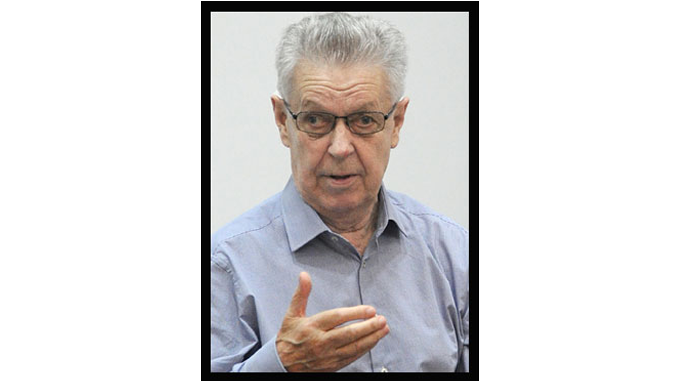
On 13 September 2023, Igor Anatolievich Golutvin, Professor, full member of the Russian Academy of Engineering Sciences, Russian Academy of Natural Sciences, International Academy of Sciences, Honoured Scientist of the Russian Federation, Chief Researcher of the Scientific and Experimental Physics Department at CMS at VBLHEP, passed away.
Igor Anatolievich Golutvin was born on 8 August, 1934 in Moscow. He graduated from MIPT in 1957 and started his work at JINR in 1958.
Igor Anatolievich Golutvin was an outstanding scientist, who gained international prestige. He was the founder of a new direction and new research techniques in the field of elementary particle physics, techniques of physical experiments, the author of more than 1400 scientific papers and three inventions. Several generations of modern large-scale physics facilities were developed under his supervision for experiments at the JINR Synchrophasotron, the IHEP accelerator in Serpukhov, at the proton synchrotron and the Large Hadron Collider at CERN in Geneva. All this work had a major impact on the general level of techniques of physical experiments.
I. A. Golutvin is one of the pioneers of the project of the experimental complex CMS (Compact Muon Solenoid) at the Large Hadron Collider, a unique and unrivalled multi-purpose detector on the scale of an engineering scientific project. The project involves the international community of physicists from more than 40 countries based on the European Organization for Nuclear Research (CERN) aimed at tackling the cornerstone issues of modern subnuclear physics. An integral part of this project is the cooperation of Russia and other JINR Member States – RDMS CMS, developed under the scientific leadership of I.A. Golutvin and bringing together more than 300 scientists. Over the last thirty years, under the supervision of Igor Anatolievich, with the widespread involvement of the industrial and scientific potential of Russia, RDMS physicists have completed the development of unique detectors for the CMS facility. A long-term scientific programme of research in this experiment has been developed, which is the most important direction of the Russian national programme in particle physics. A distributed grid system has been developed in Russia for storing, processing and analyzing experimental data, integrated into a worldwide system that provides global integration of information and computing resources. All this work opened up the opportunity for Russian scientists to participate in the ambitious physics project of the 21st century at the Large Hadron Collider.
In 2009-2013, an international team headed by I.A. Golutvin carried out effective experimental research in the first run at the Large Hadron Collider at energies up to 7 TeV that in 2012 resulted in the discovery of the Higgs boson at the CMS facility. The key author of this discovery is I.A.Golutvin, who was awarded the High Energy and Particle Physics Prize of the European Physical Society for the discovery of a new heavy particle with the properties of the Higgs boson as part of the CMS Collaboration (2013). He was also awarded the Cherenkov Prize of RAS (2014) for his outstanding contribution to the development of the CMS facility, which resulted in the discovery of the Higgs boson.
Since 2013, under the leadership of I.A. Golutvin, the CMS detectors have been upgraded. In 2015-2023, the upgrade already made it possible to collect effectively data in runs at the Large Hadron Collider at a nominal energy of 13 TeV, to test the Standard Model and obtain restrictions on the manifestations of new physics at a record energy of colliding protons.
In recent years, Igor Anatolievich headed research on the preparation of further upgrade of the CMS facility and the development of a programme of physics research at the Large Hadron Collider at a very high luminosity until the end of the year 2030.
Under his supervision, a project concept was created for the development of calorimetry for future experiments at very high luminosity and energy with the broad participation of scientific and industrial institutes of the JINR Member States and Russia.
During his work at JINR, I. A. Golutvin established a scientific school and trained a team of active, qualified physicists and engineers, whose publications are widely recognized in Russia and abroad. Within the framework of cooperation between CMS Russia and other JINR Member States, he brought together like-minded people aimed to preserve Russian scientific schools, unique teams of engineers and physicists and developed favorable conditions for attracting gifted young physicists that is extremely important for the implementation of long-term scientific projects in Russia.
Igor Anatolievich was a member of the equipment committee of the International Committee for Future Accelerators (ICFA), an Editorial board member of the journal “Nuclear Instruments and Methods”, a Directorate member of the large international CMS Collaboration at CERN, head of the collaboration of the institutes of Russia and JINR in CMS, the organizer and head of numerous international and Russian scientific conferences and symposia.
For many years of fruitful work, I. A. Golutvin was awarded numerous state and scientific awards and prizes.
We would like to express our heartfelt condolences to the family and friends.
JINR Directorate, Laboratory Directorate, colleagues, friends